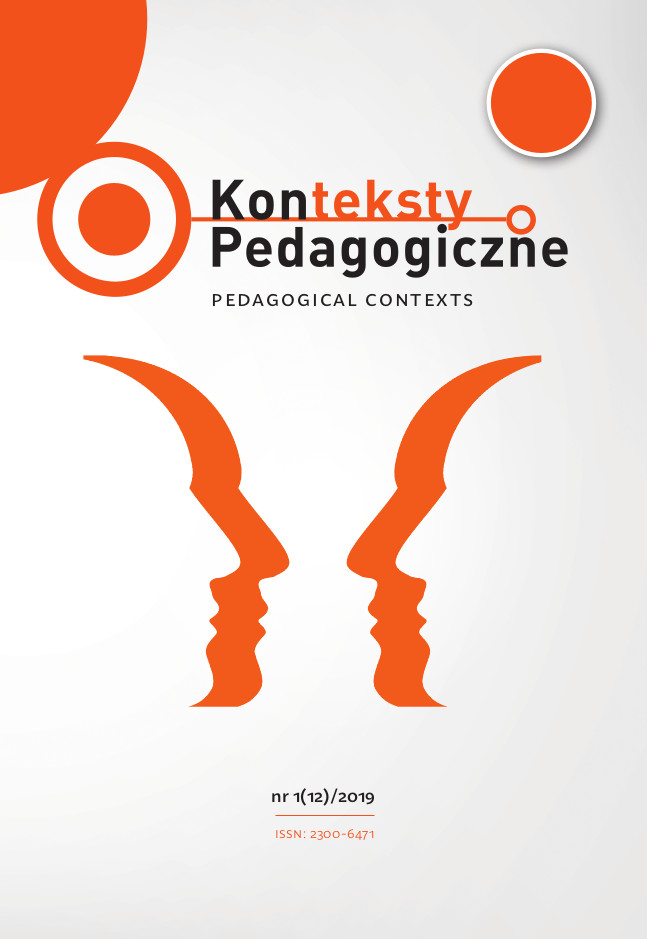Abstrakt
Celem artykułu jest przedstawienie konstrukcji oraz wstępna ocena właściwości psychometrycznych Skali Motywacji Sytuacyjnej SMS-15 dla dzieci w oparciu o teorię autodeterminacji Deciego i Ryana. W badaniu walidacyjnym wzięło udział 300 dzieci w wieku 11–15 lat (178 dziewczyn i 122 chłopaków). Skala SMS-15 ma zadowalającą trafność teoretyczną, spójność wewnętrzną oraz rzetelność. Współczynnik α Cronbacha wynosi .84 dla podskal: motywacji introjektowanej oraz regulacji przez identyfikację, a także .82 dla podskal: motywacji wewnętrznej, regulacji zewnętrznej i amotywacji.
Bibliografia
Bedyńska, S. and Książek, M. (2012). Statystyczny drogowskaz: praktyczny przewodnik wykorzystania modeli regresji oraz równań strukturalnych [Statistical Signpost: A Practical Guide to the Use of Regression Models and Structural Equations]. Warszawa: Wydawnictwo Akademickie Sedno.
Brophy, J. (2002). Motywowanie uczniów do nauki [Motivating Students to Learn], transl. K. Kruszewski. Warszawa: Wydawnictwo Naukowe PWN.
Byrne, B. (2010). Structural equation modeling with AMOS: basic concepts, applications, and programming (multivariate applications series). New York: Taylor and Francis Group.
Deci, E. and Ryan, R. (1975). Intrinsic motivation. New York: Plenum Press.
Deci, E. and Ryan, R. (2000). The “What” and “Why” of Goal Pursuits: Human Needs and the Self-Determination of Behavior. Psychological Inquiry, 11(4), 227–268.
Deci, E. and Ryan, R. (2008). Self-Determination Theory: A Macrotheory of Human Motivation, Development, and Health. Canadian Psychology, 49, 182–185.
Deci, E. and Vansteenkiste, M. (2004). Self-determination theory and basic need satisfaction: Understanding human development in positive psychology. Ricerche di Psicologia, 27, 23–40.
Góźdź, J. (2015). Konstrukcja kwestionariusza motywacji do nauki w oparciu o koncepcję Self-Determination Theory E. Deciego, R.M. Ryana [The Construction of a Questionnaire on Motivation in Education on the Basis of the Self-Determination Theory of E. Deci and R.M. Ryan]. Przegląd Pedagogiczny, 1(29), 263–270.
Huta, V. and Ryan, R. (2010). Pursuing pleasure or virtue: The differential and overlapping well-being benefits of hedonic and eudaimonic motives. Journal of Happiness Studies, 11(6), 735–762.
Janeiro, I. (2010). Motivational dynamics in the development of career attitudes among adolescents. Journal of Vocational Behavior, 76(2), 170–177.
Jankowski, K. and Zajenkowski, M. (2009). Jakich informacji o teście dostarcza testowanie? [What Information Does Testing Provide About the Test?] In: K. Fronczyk (ed.), Psychometria. Podstawowe zagadnienia (s. 84–110). Warszawa: Wyższa Szkoła Finansów i Zarządzania w Warszawie.
Kozielecki, J. (1998). Koncepcje psychologiczne człowieka [Psychological Concepts of a Human Being]. Warszawa: Wydawnictwo Akademickie Żak.
Lawshe, C. (1975). A quantitative approach to content validity. Personnel Psychology, 28, 563–575.
Lekes, N., Gingras, I., Philippe, F., Koestner, R. and Fang., J. (2010). Parental Autonomy Support, Intrinsic Life Goals, and Well-Being Among Adolescents in China and North America. Journal of Youth and Adolescence, 39(8), 858–869.
Lichtenberg, J., Lachmann, F., Fosshage, J. (2016). Self and motivational systems: Towards a theory of psychoanalytic technique. New York: Routledge.
Mageau, G., Vallerand, R., Charest, J., Salvy, S., Lacaille, N., Bouffard, T. and Koestner, R. (2009). On the development of harmonious and obsessive passion: The role of autonomy support, activity specialization, and identification with the activity. Journal of Personality, 77, 601–646.
Meyer, J. and Gagne, M. (2008). Employee engagement from a self-determination theory perspective. Industrial and Organizational Psychology, 1, 60–62.
Ryan, R., Huta, V. and Deci, E. (2008). Living well: A self-determination theory perspective on eudaimonia. Journal of Happiness Studies, 9(1), 139–170.
Schreiber, J., Nora, A., Stage, F., Barlow, E. and King, J. (2006). Reporting structural equation modeling and confirmatory factor analysis results: A review. The Journal of Educational Research, 99(6), 323–338.
Sterczyński, R., Burczyk, P., Tucholska, K., Konwińska, M., Gmińska, B., Bławat, K., Kutajczyk, T. and Przychodzeń, B. (2010). Kwestionariusz Motywacji Szkolnej Gimnazjalisty [The School Motivation Questionnaire for Junior High School Students]. In: B. Niemierko and M. Szmigel (eds.), Teraźniejszość i przyszłość oceniania szkolnego: XVI Konferencja Diagnostyki Edukacyjnej [Present and future of school grading: 16th Conference of Educational Diagnostics] (pp. 140–152). Toruń: Grupa Tomami.
Vallerand, R. and Ratelle, C. (2002). Intrinsic and extrinsic motivation: A hierarchical model. Handbook of Self-determination Research, 128, 37–63.
Zwierzyńska, E. and Matuszewski, A. (2002). Kwestionariusz Ja i moja szkoła [The “Me and My School” Questionnaire]. Warszawa: CMPPP.
Autor zgodnie z zaleceniem MNiSW, by przeciwdziałać praktykom „ghostwriting” i „guest authorship” składając tekst dołącza oświadczenie Autora/Autorów, w którym deklaruje wkład każdego z Autorów w powstawanie publikacji. Własnoręcznie podpisane oświadczenie należy przesłać na adres redakcji:
Joanna Skibska | w formie skanu przesłać poprzez system OJS (biblioteka wydawcy).
Autorzy nie ponoszą żadnych kosztów w związku z publikacją artykułu na łamach czasopisma Konteksty Pedagogiczne oraz nie otrzymują gratyfikacji finansowej za opublikowanie tekstu. Redakcja zastrzega sobie prawo do wprowadzania niewielkich zmian w artykułach, które nie mają wpływu na merytoryczną stronę publikacji.
Autor (Autorzy) artykułu oświadcza, że przesłane opracowanie nie narusza praw autorskich osób trzecich. Wyraża zgodę na poddanie artykułu procedurze recenzji oraz dokonanie zmian redakcyjnych. Przenosi nieodpłatnie na Wydawnictwo Libron autorskie prawa majątkowe do utworu na polach eksploatacji wymienionych w art. 50 Ustawy z dnia 4 lutego 1994 r. o prawie autorskim i prawach pokrewnych – pod warunkiem, że praca została zaakceptowana do publikacji i opublikowana.
Wydawnictwo Libron posiada autorskie prawa majątkowe do wszystkich treści czasopisma. Zamieszczenie tekstu artykuły w repozytorium, na stronie domowej autora lub na innej stronie jest dozwolone o ile nie wiąże się z pozyskiwaniem korzyści majątkowych, a tekst wyposażony będzie w informacje źródłowe (w tym również tytuł, rok, numer i adres internetowy czasopisma).
Tekst jest udostępniany w internecie na licencji CC-BY-SA

